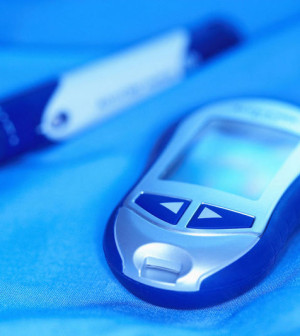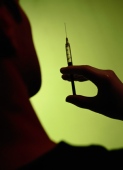- Could Artificial Sweeteners Be Aging the Brain Faster?
- Techniques for Soothing Your Nervous System
- Does the Water in Your House Smell Funny? Here’s Why
- Can a Daily Dose of Apple Cider Vinegar Actually Aid Weight Loss?
- 6 Health Beverages That Can Actually Spike Your Blood Sugar
- Treatment Options for Social Anxiety Disorder
- Understanding the Connection Between Anxiety and Depression
- How Daily Prunes Can Influence Cholesterol and Inflammation
- When to Take B12 for Better Absorption and Energy
- Epsom Salts: Health Benefits and Uses
Certain Diabetes Drugs May Aid Weight Loss by Curbing Cravings


A class of drugs used to treat diabetes also appears to help patients lose weight by changing how the brain responds to food, a new study suggests.
Researchers have been trying to learn how gut-hormone based medications called GLP-1 receptor agonists also help people with type 2 diabetes shed excess pounds.
A Dutch team said the drugs may reduce cravings and increase satisfaction while eating. The researchers looked specifically at the injectable GLP-1 receptor agonist exenatide (Bydureon, Byetta).
Their findings are to be presented Tuesday at the American Diabetes Association (ADA) annual meeting in Boston. Studies presented at meetings are generally viewed as preliminary until they’ve been published in a peer-reviewed journal.
“When you eat, there are several hormones released. GLP-1 is one of them,” Dr. Liselotte van Bloemendaal, a Ph.D. student at the Diabetes Center, VU University Medical Center in Amsterdam, Holland, said in an ADA news release.
“These hormones relay information to the central nervous system about nutritional status to regulate appetite. Using functional MRIs [which measure brain activity by detecting changes in blood flow], we looked at the reward centers in the brains of obese individuals with and without type 2 diabetes and measured the response to the anticipation of and drinking of chocolate milk while being given GLP-1 receptor agonist intravenously versus placebo,” she explained.
When given the drug, the brain didn’t anticipate the food reward as much. The researchers said this could lead to reduced cravings. The drug also seemed to increase the feeling of reward from food while people were eating, which might reduce overeating, according to van Bloemendaal.
The findings may lead to new treatments for obesity, she said. Van Bloemendaal also wants to determine whether these drugs can reduce cravings for drugs, alcohol and nicotine.
More information
The U.S. National Institute of Diabetes and Digestive and Kidney Diseases explains how to choose a safe and effective weight-loss program.
Source: HealthDay
Copyright © 2026 HealthDay. All rights reserved.










